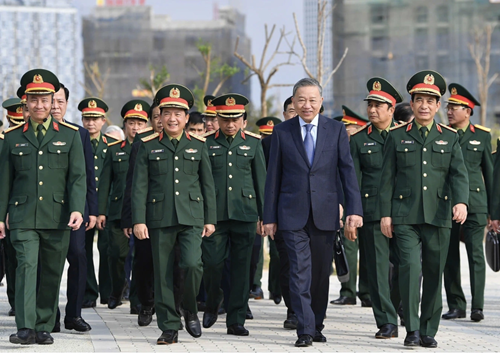Established on July 17, 1956, the Vietnam Military History Museum is one of the six national-level museums and the first of its kind within the military museum system. Since 2020, under the direction of the Central Military Commission, the Ministry of National Defense, and the General Department of Political Affairs of the Vietnam People's Army (VPA), a new establishment of the museum has been built in Tay Mo and Dai Mo wards of Nam Tu Liem district, Hanoi.
    |
 |
|
Party General Secretary To Lam visits the Vietnam Military History Museum in Hanoi on December 3. |
The first phase of the museum was open to the public on November 1 this year.
Spanning 64,640 square meters across four above-ground floors and a basement, the museum features a modern design with multiple functional areas and advanced projection technologies. Its main exhibits are organized into six themes, charting pivotal chapters in Vietnam’s history: the early days of nation-building and defense (700 BC - 938), the protection of national independence (939 - 1858), the fight against the French colonialists for national independence (1858 - 1945), the resistance war against the French colonialists (1945 - 1954); the resistance war against the U.S. imperialists (1954 - 1975); and the period of national construction and defense (1975 - present).
Expressing his impression of the museum’s design and its extensive collection of artefacts, the Party chief said these vividly demonstrate the development of the heroic VPA, and that the museum has attracted visitors from diverse backgrounds
He described the museum as a "red address" for learning and researching the pride-worthy national safeguarding process of Vietnam, especially the Party's clear-sighted and skillful leadership during each period of national development.
At the meeting, General Secretary Lam asked the museum to continue highlighting the vital role of the people in the resistance wars and in the country's military and defense policies because the VPA is a military of the people. Besides, exhibits should better illustrate the VPA's international responsibilities.
To fully complete the museum in line with the approved investment policy of the Central Military Commission's Standing Committee and the Ministry of National Defense, he urged relevant ministries, agencies, and localities to continue supporting the ministry in completing the second phase. This will solidify the museum’s status as a historical and cultural landmark, a destination for research and education, and a place for upholding and promoting the nation’s proud traditions spanning thousands of years.
Source: VNA